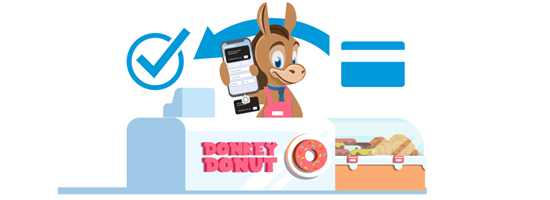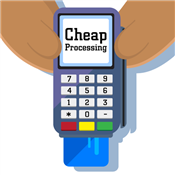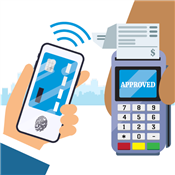How to Accept Credit Card Payments Without a Merchant Account
Merchant accounts can be too complicated for small businesses. Here's how to quickly accept credit card payments without a merchant account.
 |
- How to Accept Credit Cards Without a Merchant Account
- How Merchant Accounts Work
- How Third-Party Processors Work
- Accepting In-Person Payments Without a Merchant Account
- Accepting Online Payments Without a Merchant Account
- When Not Using a Merchant Account is Better
- Downsides Compared to Merchant Accounts
- Best Providers Without a Merchant Account
So you started your own business. Congrats! Now you need to figure out how to start taking credit card payments.
You probably heard that you need to get a merchant account. This is a special type of account that lets you accept credit cards payments.
But traditional merchant accounts require an approval process. They want to see that your business is well established.
What if you're a new business? Luckily, there are lots of options for accepting credit card payments without a merchant account.
How to Accept Credit Cards Without a Merchant Account
 |
Payment service providers (PSP) allow you to accept credit card payments without a merchant account. They offer a more simplified processing solution for new businesses.
These providers let you get started right away without a lengthy application process. You just sign up, get the required equipment, and can start taking cards. They also have simpler pricing that's pay-as-you-go.
Even if you're not familiar with the term, you probably have heard of Square, Stripe, and PayPal processing. These are some of the most popular PSPs.
They're also often called third-party payment processors or credit card aggregators. Just different names for the same thing.
- New and small businesses processing less than $5,000 per month
- Seasonal businesses
- If you don't qualify for a traditional merchant account (like if you had credit issues)
But first, let's go over the difference between a merchant account and a third-party processor. We know, it's a little confusing.
How Merchant Accounts Work
Merchant account providers offer full-service credit card processing. The main thing is that you get your own merchant account with a unique merchant ID number just for your business.
When you take a credit card payment, the money doesn't just go straight to your bank account right away. The payments are first settled into your merchant account. After the processing fees are deducted, then the money is transferred to your bank account in 1-2 days.
Typically, merchant accounts require underwriting to approve you as a client. They want to know that your business isn't a risk to them. So it's best for larger, established businesses.
Stax, Helcim and Payment Depot are examples of merchant account providers.
How Third-Party Processors Work
With a third-party payment processor, you don't get your own unique merchant account ID. Instead, your transactions are processed together with many other businesses into one huge shared merchant account.
This allows PSPs to offer their service without a lot of extra costs, like monthly fees or monthly processing minimums.
PSPs don't require underwriting. So new businesses can just sign up and take credit card payments almost right away.
But how do you start accepting credit cards? Let's get into that next.
Accepting In-Person Payments Without a Merchant Account
Payment service providers can be a good solution whether you have physical storefront, food truck, market stall, or travel to your clients.
They usually offer a mobile card reader - a lot of times even for free. You just plug it into your smartphone to swipe credit cards. It turns your phone into a point of sale (POS) and you complete the transaction on your screen. Super easy.
Since you only need your phone, you can accept credit cards from anywhere. But if you run a storefront and need more robust equipment, you can also get credit card terminals and even registers.
PSPs usually offer excellent mobile apps. They often have more features than just processing credit cards. For example, Square's POS app also lets you set discounts, issue refunds, add tips, manage inventory, and track employees.
Accepting Online Payments Without a Merchant Account
 |
To accept online payments, you need a payment gateway. This is a software that authorizes online payments and transfers the data. Third-party payment processors usually include this for free.
The important thing, of course, is that you need a website. But how to turn it into an online store and accept card payments?
If you already have a website (like WordPress or Wix), you can just use a plugin to add payment buttons. For example, there are lots of WordPress plugins that support Stripe and PayPal.
If you don't yet have a website, you can build your own eCommerce store, like with Shopify or Square. This lets you create a more professional online store. And you get an all-in-one solution that includes the store, hosting, and processing.
Is a third-party provider the right choice for your business? Here are some pros and cons you can expect.
When Not Using a Merchant Account is Better
If you're a new or small business processing less than $5,000 a month, then you don't need a merchant account. A third-party payment service provider is a better choice.
Here's why:
Simpler pricing
PSPs usually offer simple, flat-rate pricing. You pay the same processing fee no matter what type or brand of card. Whether it's Visa, Mastercard, American Express, debit, premium rewards card, it's all the same fee. For example, Square's per-swipe fee is 2.6% + 15¢ (Free), 2.5% + 15¢ (Plus), and 2.4% + 15¢ (Premium).
No contract
Payment service providers is pay-as-you-go with no contract. If you don't have any sales for a month, then you don't pay anything. That's why it's great for small businesses with inconsistent sales, or seasonal businesses.
No underwriting
New businesses may have trouble getting a merchant account because they haven't yet established business history. But with a payment service provider, you can just sign up and get started right away.
But in exchange for this convenience and simplicity, there are trade-offs. Let's take a look at the cons.
Downsides Compared to Merchant Accounts
Higher rates
The flat-rate pricing may be simple, but it's higher than what you'd get with a merchant account. If you have high sales volume, you'll be paying a lot more in processing fees.
Plus, because merchant accounts are a direct agreement just for your business, the rates and terms are often negotiable. You can't negotiate for better rates with a PSP processor.
Account stability
No approval process is great for new businesses. But this means you were not evaluated for risk beforehand. Instead, you'll be examined more afterwards.
Because of this, payment service providers tend to hold or freeze your account if they see suspicious activity. And if you are deemed too risky (like getting a lot of chargebacks), they can even terminate your account with little warning.
Poor customer service
Unfortunately, PSPs aren't known for amazing customer service. They want you to rely on the online knowledge database first. Merchant account provides usually have better customer support with more knowledgeable reps.
If your business is steadily processing at least $5,000 in sales, then getting a merchant account will be better. You'll be able to benefit from lower processing rates and less account stability issues.
Preventing Fraud
Fraud is a big concern for most merchants - especially online businesses. Most PSPs include fraud prevention tools to help you reduce risk and chargebacks.
Your transactions are monitored in real-time as they're made. If something seems suspicious, the provider will notify you right away, while they continue to investigate. Meanwhile, you can hold off on shipping the order until you get an answer.
If there's no confirmation or you don't feel right about it, it's best to issue a refund immediately. That way, it can't be disputed and you won't have to deal with a chargeback and losing money.
Best Providers Without a Merchant Account
Even though there are some downsides, a third-party processor may be the best (or even only) choice for new businesses. Here are our top recommendations for payment service providers.
Square
Square is one of the most popular for a good reason. The app has tons of features that allow you to turn your smartphone into a powerful point of sale. It can even be used offline, so you can accept credit cards without an internet connection.
All accounts get a free virtual terminal, payment gateway, and online store. Everyone can also get a free swipe reader that plugs into your phone.
PayPal
PayPal lets customers pay with PayPal on your website and even in store. It can be a big advantage to offer this payment option.
The per-swipe fee is 2.29% + $0.09. This comes out to be a better deal for businesses with small average transaction size under $100.
QuickBooks
QuickBooks GoPayment seamlessly integrates with your QuickBooks Online account. The per-swipe fee is 2.4% + 25¢, which works best for small businesses with a larger average transaction size over $100. You can get a free chip and swipe reader.
Stripe
Stripe is perhaps the most powerful payment processor for online businesses. It's good for eCommerce stores, subscription services, and in-app purchases.
Stripe is known for being able to create a completely customized checkout experience. It's best if you have a developer on staff to make use of these advanced tools.
Shopify
Shopify is a popular eCommerce platform with integrated payment processing. It's a good choice if you want an all-in-one online store and processing. It has several plans for different sized businesses. Larger businesses can get reduced rates.
Bottom Line
It is possible to accept credit card payments without a merchant account by using a third-party payment service provider, like Square or PayPal. This is the best choice for small businesses processing less than $5,000 a month.
But there are some downsides. The biggest con is that your processing rate will be higher than using a merchant account. This is why once you're more established with steady monthly sales, it's best to switch to a real merchant account to get the best rates.
Anna G is a research director at CreditDonkey, a credit card processing comparison and reviews website. Write to Anna G at feedback@creditdonkey.com. Follow us on Twitter and Facebook for our latest posts.
Note: This website is made possible through financial relationships with some of the products and services mentioned on this site. We may receive compensation if you shop through links in our content. You do not have to use our links, but you help support CreditDonkey if you do.
Not sure what is right for your business?
|
|
|
Answer a few short questions in our credit card processing quiz to receive tailored recommendations to help you keep more profits.
|
|
| ||||||
|
|
|
















